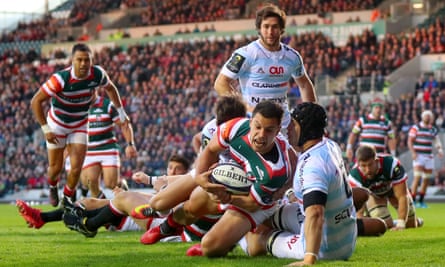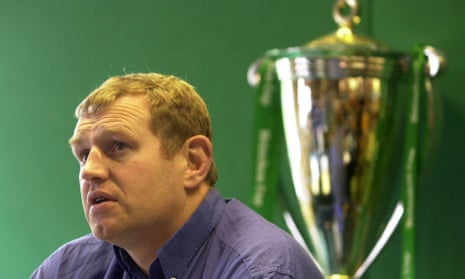“Happy new year to you all,” wrote Richard Cockerill in what turned out to be his final programme notes as Leicester’s director of rugby on Sunday. Less than 24 hours later, the club announced he had been sacked following the defeat by the Premiership club who have become as dominant this decade as the Tigers were in the 2000s, Saracens.
Cockerill became the second director of rugby of a Premiership club to lose his job this season following Andy Robinson’s dismissal by Bristol and five sides are now under different management from last season, as are the relegated London Irish. Leicester could not be accused of acting in haste as they faced up to a prospect of missing out on a trip to Twickenham in May for a fourth consecutive season. But as they showed in 2004 when removing another stalwart who had spent 23 years at Welford Road, Dean Richards, sentiment stretches only so far.
Cockerill was in typically pugnacious mood after the defeat against Saracens, as he had been following the reverses at Exeter and Munster in the previous month, answering questions honestly and backing himself to get Leicester into the top four and the knockout stage of the European Champions Cup. His side, though, had tended to become threatening only after a heavy defeat, reacting rather than setting the tone as in days gone by.
They had brought in Aaron Mauger as head coach in the summer of 2015 to provide a tactical uplift, but instead it created uncertainty. Who was in charge tactically? Who did players need to impress most? The helm seemed to be pulled one way and then the other, the ship scraping along rocks more often than sailing in still waters. Just as Eddie Jones brought clarity to England, so Leicester need a clear vision now.
Before the start of the Twickenham double-header in 2004, Leicester were by some distance the best supported club in England and the only one to regularly record a profit. At the end of the previous season, their average gate for a league match was 16,120; Northampton were second, 5,000 behind. Bath, Wasps and Saracens did not make it into five figures.
It was a time when Leicester could sign big names from abroad, such as Pat Howard, Rod Kafer, Mauger – who is in interim charge of the first team after Cockerill’s departure – and Daryl Gibson, supplementing them with those lesser known such as Marcos Ayerza and Martin Castrogiovanni. These days, the elite end up in the Top 14 or as a marquee signing for English clubs able to live beyond their means.
Just as Roman Abramovich changed Premier League football when he bought Chelsea in 2003 and covered debts of £80m, so the ownership model of clubs ahead of Leicester in the table, Exeter excluded, has recalibrated the Premiership.
Saracens’ debt stood at more than £45m last year after an annual loss of nearly £4m, a shortfall covered by the club’s parent company, Premier Team Holdings Limited.
Bath lost £1.8m last year, down from £3m in 2014. Wasps lost £2.4m and took £35m in debt when they issued a bond scheme that is due in 2022, by which time the club anticipate a significant rise in revenue from outside rugby through the Ricoh Arena. Leicester, a public limited company, have the highest turnover of any Premiership club and the largest number of regular supporters, but paying to improve facilities – the latest upgrade at Welford Road cost £8m – left them reaching the salary cap but not making any marquee signings until the arrival of the Australian centre Matt Toomua last summer, and he played just a couple of matches before sustaining a long-term knee injury.

Leicester find themselves in the position of Arsenal post-Abramovich, going from vying for the title to battling for a top-four place while living within their means and reducing the debt on the Emirates Stadium.
“We are at the point where Manchester United were as a plc,” Cockerill said at the end of the 2014-15 season. “You get to a position with the Chelseas and Man Citys and ask if an owner is an option for us. We just can’t create enough revenue to compete with whoever. If Bristol come up, their owner has a lot of money. The guys at Saracens and Bath have a lot of money. As far as I’m aware, we’re not searching for an owner. We could come to a point where that may or may not happen. Or we sit where we sit and, with that amount of money, stay there or thereabouts.”
It is in one sense fitting that Leicester’s first match without Cockerill is at Wasps. A couple of years ago it would have meant a trip to Wycombe but now it is a Midlands derby with the former London club now based in Coventry, a shortish drive from Leicester and Northampton, another club run on business lines that are scrabbling to keep up.
Gloucester are another, but they hope that an approach for a 54% stake in the club by the Montpellier owner, Mohed Altrad, will be approved by the organisers of the European Champions Cup and Challenge Cup – they have the right of veto because the two clubs could meet in one of the tournaments, raising an integrity issue.
Altrad has promised to make a significant investment in Gloucester if he does take over. That would put more pressure on Leicester to look at their model but, with Exeter reaching the Premiership final last season and now third in the table after a slow start, the Tigers may feel that, like their football neighbours Leicester City, money is not the only currency and that team spirit, unity and ambition count for as much.
The board’s first task is to look at the coaching setup. Does it go for a director of rugby in the Martin Johnson mould, someone who would let the head coach run the rugby side while having responsibility for recruitment and contracts, or continue with the current structure? Then comes the question of how to compete with clubs such as Saracens, who are able to absorb large losses. Is the old way, on and off the pitch, becoming the wrong way for a club that should be the model for others?

Comments (…)
Sign in or create your Guardian account to join the discussion